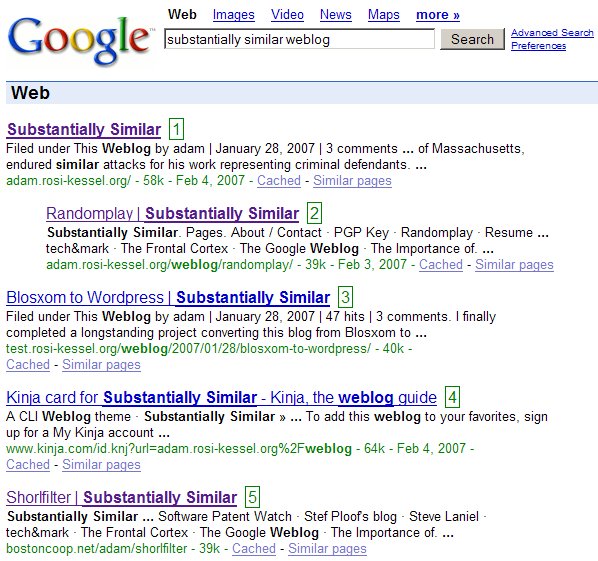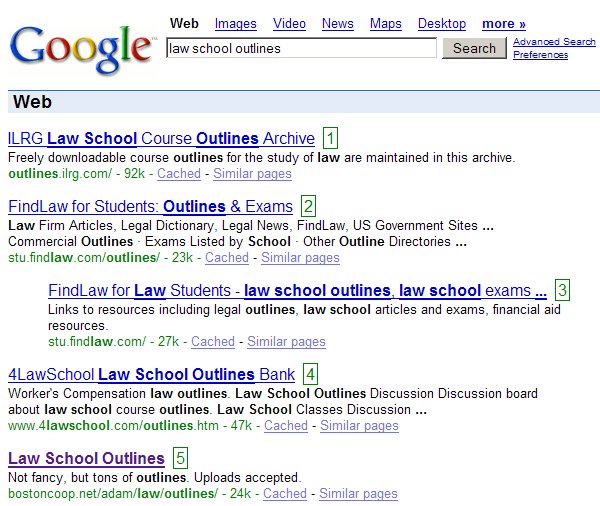Filed under The Law, The Web by adam | March 26, 2007 | 0 comments
The Children’s Online Protection Act, or COPA, requires website operators who provide commercial material that could be “harmful to minors” to verify their users’ age, for example, with a credit card. The statute was immediately challenged as unconstitutional under the First Amendment. A preliminary injunction against enforcement of the law was upheld by the Supreme Court, which remanded the matter for factual development as to whether filters could accomplish the same purpose while interfering less with free speech. (Ironically, the ACLU found itself in the unusual position of arguing for Internet filters in this case.)
It was just about one year ago that the Government sought to enforce a subpoena against Google for records of user queries and URLs stored in Google’s database. The court granted the motion with respect to stored URLs but not queries in Gonzales v. Google. It was never quite clear what the Government would really do with the data or why they pushed so hard to get it after receiving what they needed from other search providers. (The U.S. apparently argued Google’s search results would “add luster” to its analysis).
In any case, the statute has now finally been held unconstitutional. As Ed Felten insightfully points out, unlike in previous instances where courts have struck down Internet speech regulation, in his opinion, Judge Reed did not provide a roadmap for Congress to try yet again to enact a law that would pass First Amendmend muster. Maybe Congress will leave the issue alone for a while:
Two things make the judge’s ruling relatively roadmap-free. First, it is based heavily on factual findings that Congress cannot change — things like the relative effectiveness of filtering and the amount of HTM material that originates overseas beyond the effective reach of U.S. law. (Filtering operates on all material, while COPA’s requirements could have been ignored by many overseas sites.) Second, the alternative it offers requires only voluntary private action, not legislation.
Congress has already passed laws requiring schools and libraries to use content filters, as a condition of getting Federal funding and with certain safeguards that are supposed to protect adult access. The courts have upheld such laws. It’s not clear what more Congress can do. Judge Reed’s filtering alternative is less restrictive because it is voluntary, so that computers that aren’t used by kids, or on which parents have other ways of protecting kids against HTM material, can get unfiltered access. An adult who wants to get HTM material will be able to get it.
Doubtless Congress will make noise about this issue in the upcoming election year. Protecting kids from the nasty Internet is too attractive politically to pass up. Expect hearings to be held and bills to be introduced; but the odds that we’ll get a new law that makes much difference seem pretty low.
Filed under Culture, Film, Music, The Web by adam | March 19, 2007 | 4 comments
A reason to love YouTube: Chaiyya Chaiyya.
[Tags]Bollywood, Youtube[/Tags]
Filed under The Law, The Web by adam | March 15, 2007 | 2 comments
PCWorld provides a list of the 50 most important people on the web. Topping the list, unsurprisingly, are Eric Schmidt, Larry Page, and Sergey Brin. Other usual suspects include Steve Jobs, Bram Cohen, Jimmy Wales, Bruce Schneier, and Craig Newmark.
I was disappointed that there wasn’t a single practicing attorney on the entire list. The closest they got is Larry Lessig, who is admittedly a lawyer of sorts, but at least in my mind more of an academic. A couple of others appear to be former lawyers.
I’d like to think we lawyers can make enough of a positive difference to be “important.” The optimistic view might be that practicing attorneys need to keep a lower profile on the sorts of issues that attract PCWorld and the like and are thus unlikely to be recognized publicly. The pessimistic view is that the technologists and business people just matter a lot more.
Filed under Life, The Web by adam | March 14, 2007 | 0 comments
Ken (Chung-chieh) Shan started a blog this year, apparently running on ikiwiki software. Ken is one of those people whom you want to have a blog.
The focus seems to be linguistics (generally Ken’s academic field) and “miscellaneous.”
Welcome to the blogosphere, Ken.
Filed under The Web by adam | March 5, 2007 | 0 comments
In case anyone is relying on me to point them to the funniest episodes of The Show with Zefrank, this (today’s) is one, especially if you spend any time on Friendster or that odd new generation Myspace.com (when I was young, we had a public_html directory, and we knew how to set permissions on it! I also truthfully walked nearly a mile in freezing weather and snow uphill to get to the school bus).
Apparently, The Show will be done for good in just under two weeks. Who knows where all the fans will go?
Filed under The Web by adam | March 1, 2007 | 0 comments
Filed under The Web, This Weblog by adam | February 5, 2007 | 4 comments
Changes are afoot at Google. A couple of weeks ago Google announced that it is refining its algorithms to minimize the impact of “Google Bombs.” (It’s curious that they made a big announcement rather than just doing it covertly, but perhaps this way they get to control how the news is framed.) Apparently, link text will be weighted less heavily in determining relevance to search terms. Presumably this means the page content will get more weight — ultimately there are only a few parameters that can serve as inputs in PageRank.
A couple of weeks ago, I adopted the name Substantially Similar for this blog. I was looking for something clever and suggestive of the focus of this blog, but not overly clever or too narrowly focused. (I leave it to my readers to tell me if it works.) As a test case for Google’s new algorithm, this seems to be proof positive:

I am fairly certain no one has created a link to me yet with the link text “substantially similar,” yet I’m already the top result.
Another change I noticed is the substitution of third-party descriptions of URLs instead of excerpt text. I don’t know if this is a new development or not, but it’s an interesting departure from what I’ve seen before:

That last link above is my old law school outline site — and the text “not fancy, but tons of outlines” doesn’t appear anywhere on the page itself. Instead, it is a description of the site from a couple of outline “portal” pages.
Filed under The Web by adam | February 1, 2007 | 3 comments
Via rajbot, this amazing CLI-themed WordPress blog. I wish I had that kind of time on my hands.
Filed under The Web by adam | December 12, 2006 | 1 comment
As it has become virtually costless to become a web video publisher, we’re seeing more and more really funny noncommercial content. To make a funny web video, you don’t really need anything, other than to be funny. Special effects and paid actors are not really essential and perhaps detrimental.
After much urging by Steve, I have finally become a devotee of The Show with Ze Frank. See this wikipedia entry for background. I suspect if The Daily Show had been born a few years later, it might have taken the no-budget format that Ze Frank uses. (The fact that the show is the top result in a Google search for the show (no quotes) must be some proof of its worth.) I was going to recommend a particularly good episode, but they’re all great.
Also via Steve, this excellent piece about OS X and Linux security (slightly not work-safe). Lest you think I’m unduly influenced by Steve’s recommendations, I should point out that Steve has finally gotten around to taking some of my suggestions.
(As a follow-up, I’ve been meaning to assemble my numerous tips in assembling/publishing video from linux, but the list keeps growing. Unfortuantely, it’s not trivial, but once you’ve figured out all the arcane pieces it’s possible to have a pretty efficient video production workflow. I’ll get around to documenting it eventually.)
Filed under The Web by adam | December 6, 2006 | 0 comments
Via Rajbot, CanvasPaint:
A near pixel-perfect copy of Microsoft Paint in HTML, CSS and JavaScript, using the

Maybe we don’t need Flash so much after all.


